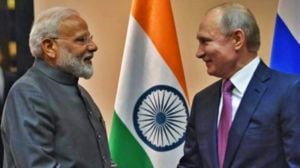Spring in the autumn of the patriarch
When the end came past midnight Wednesday at the Escorts Heart Institute and Research Centre in Delhi, there couldn’t have been a great...

When the end came past midnight Wednesday at the Escorts Heart Institute and Research Centre in Delhi, there couldn’t have been a greater tribute to Gurcharan Singh Tohra than the lakhs at the Golden Temple, cleaning the holy sarovar to realise his dream.
When he first became chief of the Sikh Gurdwara Prabhandak Committee (SGPC) in 1973, one of his first acts was to inititate kar sewa for the sarovar. Three decades later, he started the work again: this time to instal a filtration plant. On Day One, as lakhs showed up, 80-year-old Tohra suffered a heart attack which finally led to his death tonight, hours after he was flown in from Amritsar.
Tohra is folklore in Punjab. In the early 1960s, as a young man, he campaigned on a bicycle for elections to the
Gurdwara committee. Shortly after he was handed the party ticket, they gave him a rickety jeep and Rs 2,000 for campaign expenses. After he won the elections, Tohra walked up to Akali G S Tohra is dead
Dal chief Master Tara Singh and handed over Rs 1,300. He said he couldn’t spend the money.
Although he never became Akali Dal chief or a minister, Tohra’s imprint has always been all over Sikh politics. To many, his puritanical streak was the face of a hardliner. His constant dabbling in politics and a certain religious aura was an oddity in Sikh affairs.
To the devout, there very few clean politicians like him. In six decades of public life, his landholding remained the same. Perhaps the only property change he made was add an RCC roof to his old, kuccha house. And when it came to adopting children, he preferred to adopt a girl—in a state with the worst sex ratio in the country. Later, he spurned well-heeled suitors to marry her to an ordinary clerk at a simple ceremony.
At the crack of dawn, Tohra would start meeting people in his village home. By six he would have set out on a little tour— moving from one gurdwara to another, visiting a school, college or meeting people. Unlike others who would love to spend a day in Chandigarh, he would return to his village —every night. Barring the Akali agitation days, this was his daily routine.
For years, he did not have a telephone at his home: ‘‘Sardarni tung haugee (the phone will trouble my wife).’’
The one luxury that he allowed himself was a car to make his daily travel comfortable. But a car was never bought. It would be offered by one of his associates and duly returned.
To his credit, Tohra gradually re-built the institution of the Akal Takht. He often said: ‘‘Sikhs have the Akal Takht, the supreme religio-political entity which no other community has.’’ But he was accused of misusing the institution, of appointing Jathedars who would later summon the likes of Badal to the Akal Takht.
He had his failings. His writ failed to run when Bhindranwale took over the Golden Temple complex. By his own admission, he had failed to stem the rise of self-styled babas and sants in Sikhism. But now that he is gone, he will surely be missed. Even outside Sikhdom. — (with Toufiq Rashid in Delhi)


- 01
- 02
- 03
- 04
- 05





























